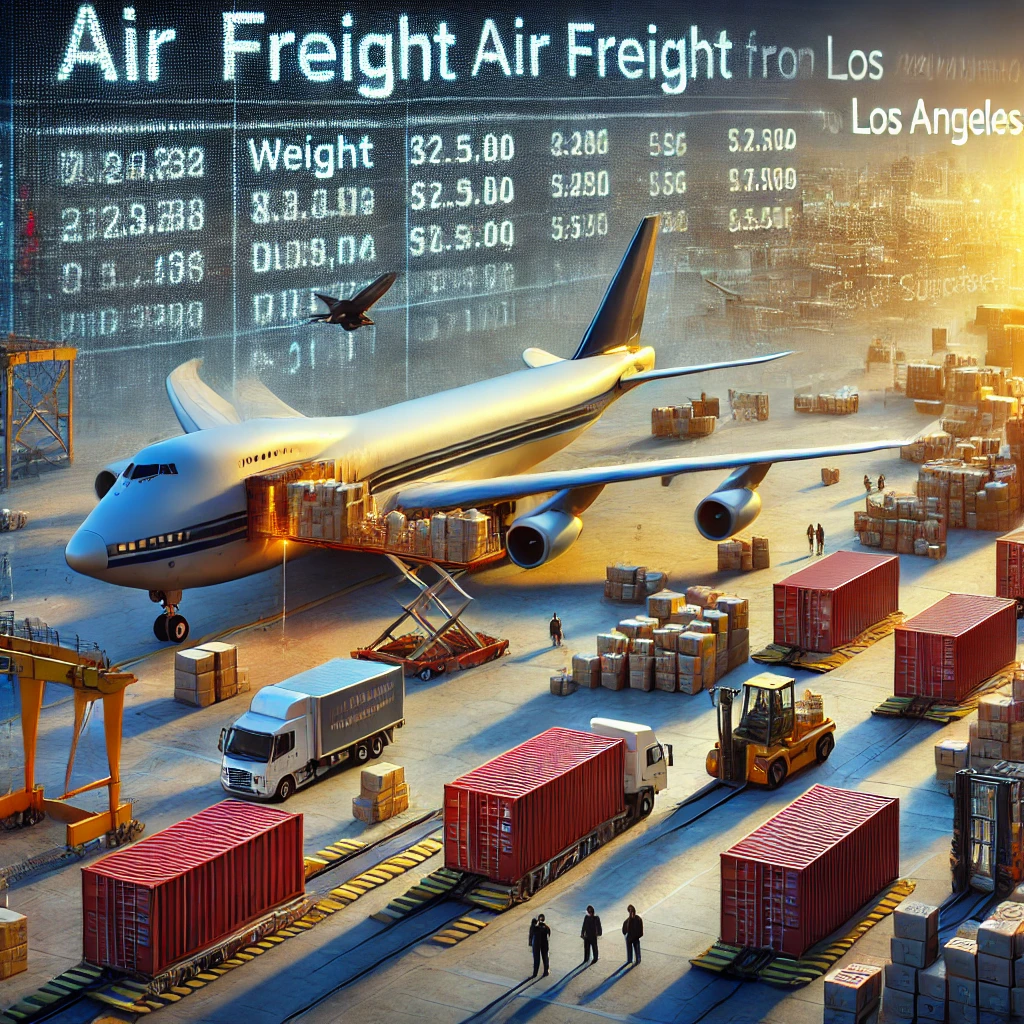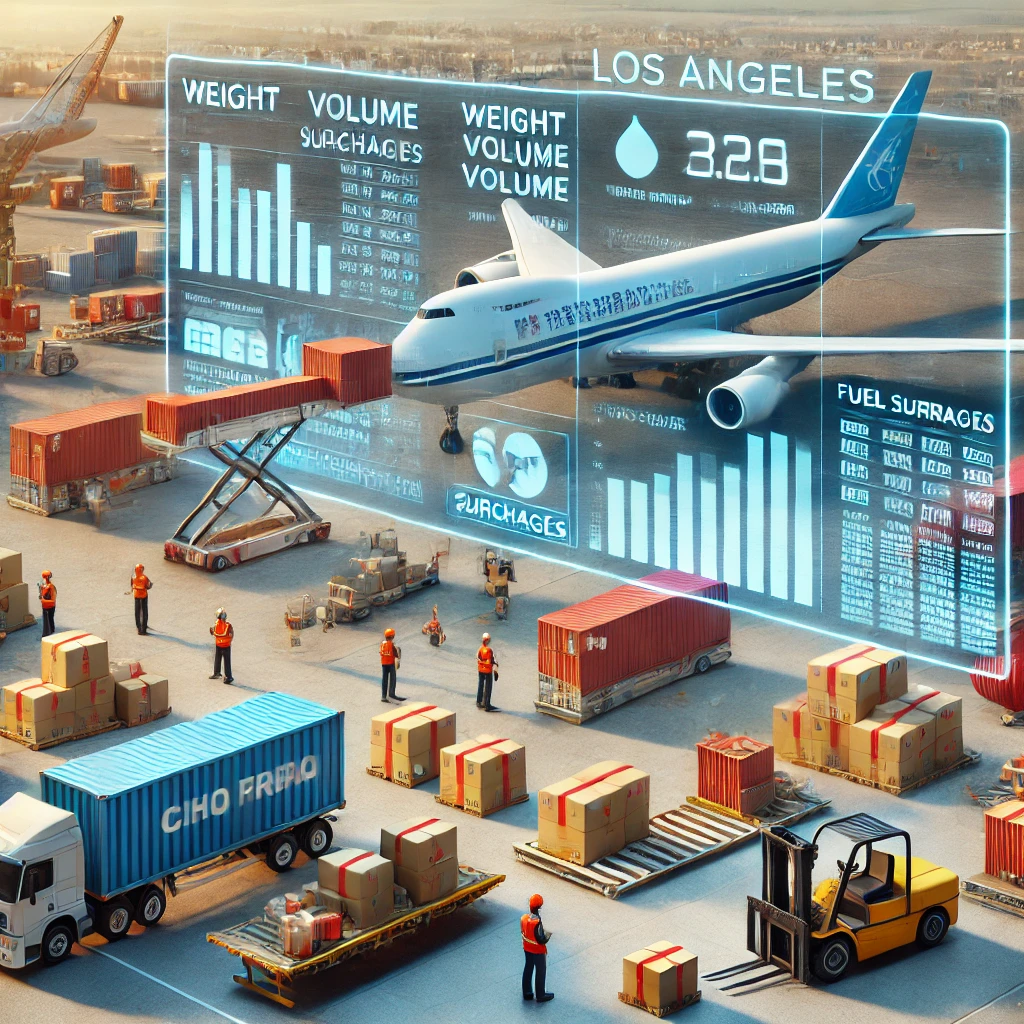How Much for Air Freight from China to Los Angeles: A Comprehensive Cost Guide

Factors Affecting Air Freight Costs
Several factors influence the cost of air freight from China to Los Angeles:
- Weight and Volume: The chargeable weight, which is the greater of actual weight or volumetric weight
- Type of Goods: Nature, value, and special handling requirements of the cargo
- Urgency: Express vs. standard air freight options
- Fuel Surcharges: Fluctuating based on global oil prices
- Season: Peak seasons (e.g., holidays) may incur higher rates
- Airport Fees: Varying charges at origin and destination airports
- Customs Duties and Taxes: Not included in freight costs but part of overall expense
- Insurance: Optional but recommended for valuable shipments
Current Cost Estimates (as of 2024)
Note: These are approximate ranges and can vary based on specific circumstances
- For General Cargo:
- Small packages (up to 50 kg): $5 – $8 per kg
- Medium shipments (50-500 kg): $4 – $6 per kg
- Large shipments (500+ kg): $3 – $5 per kg
- Express Services: Can be 30-100% more expensive than standard air freight
- Minimum Charge: Often around $150-$200 for very small shipments
Breakdown of Costs

- Base Freight Rate: 60-70% of total cost
- Fuel Surcharge: 20-30% of total cost
- Security Surcharge: 5-10% of total cost
- Terminal Handling Charges: Varies by airport, typically $0.15-$0.25 per kg
- Documentation Fees: $50-$100 per shipment
Additional Considerations
- Customs Clearance: Usually $100-$200 per shipment
- Delivery to Final Destination: Varies based on location in Los Angeles area
- Insurance: Typically 0.5-1% of the cargo value
How to Get an Accurate Quote
- Provide Detailed Information:
- Exact dimensions and weight of the shipment
- Nature of goods
- Preferred timeline
- Special handling requirements
- Compare Multiple Providers: Get quotes from at least 3-5 freight forwarders
- Understand Inclusions and Exclusions: Ensure quotes specify all charges
- Consider Door-to-Door vs. Airport-to-Airport: Full service often simplifies the process

Tips for Reducing Air Freight Costs
- Optimize Packaging: Reduce volumetric weight where possible
- Plan Ahead: Use standard services instead of express when time allows
- Consolidate Shipments: Combine multiple small shipments into one larger shipment
- Negotiate Rates: For regular shipments, discuss volume discounts with forwarders
- Be Flexible with Timing: Avoid peak seasons if possible
- Consider Air-Sea Combinations: For less urgent, larger shipments

Case Studies
- Electronics Manufacturer:
- Shipment: 500 kg of smartphone components
- Cost: Approximately $2,500 ($5 per kg) for standard air freight
- Time: 3-5 days from factory to LA warehouse
- Fashion Retailer:
- Shipment: 100 kg of designer clothes
- Cost: About $700 ($7 per kg) for express service
- Time: 2-3 days, including customs clearance

Future Trends in China-LA Air Freight
- Increased Capacity: More direct flights potentially lowering costs
- Technological Advancements: Better tracking and efficiency may reduce overheads
- Environmental Regulations: Potential for “green” surcharges in the future
- E-commerce Growth: May lead to more competitive rates for small parcels
- Geopolitical Factors: Trade relations between US and China can impact costs
Conclusion
The cost of air freight from China to Los Angeles can vary significantly based on numerous factors. While general estimates can provide a baseline, it’s crucial to get specific quotes for your shipment. By understanding the components that make up the total cost and following best practices for shipping, businesses can optimize their air freight expenses while ensuring timely delivery of goods.
Remember that the cheapest option isn’t always the best – consider reliability, transit times, and customer service when choosing a freight forwarder. As global trade continues to evolve, staying informed about market trends and maintaining flexibility in your shipping strategy will be key to managing costs effectively.
For businesses regularly shipping between China and Los Angeles, developing a relationship with a reliable freight forwarder and consistently reviewing your shipping needs can lead to more favorable rates and better service over time.
